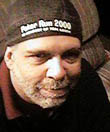|
|
 
|
|
Author
|
Topic: Robert Redford and Movie Palaces
|
|
|
John Pytlak
Film God

Posts: 9987
From: Rochester, NY 14650-1922
Registered: Jan 2000
|
 posted 10-10-2001 07:47 AM
posted 10-10-2001 07:47 AM





I agree that seeing a well-presented movie in a "classic" theatre like the El Capitan, Egyptian, or Chinese in Hollywood is a wonderful experience. But good presentation quality is a matter of "Film Done Right", regardless of whether it is an "entertainment megaplex" or a "grand ole palace". IMHO. the "total package of seeing an excellent presentation" often depends more on the PEOPLE, than the BUILDING.------------------
John P. Pytlak, Senior Technical Specialist
Worldwide Technical Services, Entertainment Imaging
Research Labs, Building 69, Room 7525A
Rochester, New York, 14650-1922 USA
Tel: 716-477-5325 Cell: 716-781-4036 Fax: 716-722-7243
E-Mail: john.pytlak@kodak.com
Web site: http://www.kodak.com/go/motion
| IP: Logged
|
|
Bob Maar
(Maar stands for Maartini)

Posts: 28608
From: New York City & Newport, RI
Registered: Feb 2001
|
 posted 10-10-2001 01:00 PM
posted 10-10-2001 01:00 PM





I think that the experience of going to an atmospheric theatre where the presentation revolved around the picture on the screen was a far better experience than attending a modern day multiplex. The difference as I perceive it is in the presentation on the screen as well as the quiet dignity of the of the staff and manners of the patrons. There were no game rooms, no hot dogs of pop corn shrimp taco's with cheese. There was Popcorn,drinks and candy. The smell of the popcorn was part of the experience. The auditoriums were well lit with manificent curtains either center draw or austrian shade. A scrim curtain was located directly behind the main and the presentation would begin on this curtain. Soft chamber type music filled your ears and set your mood. Saturdays were great you would get a short subject, a cartoon, a serial and a feature. Today you enter and slides are on the screen and acid rock or rap music is being played loudly. Then you move into rolling stock advertisments, into five or six trailers and into the main feature. It's not the same but it does help if "film is done right". My two cents.. 
| IP: Logged
|
|
Evans A Criswell
Phenomenal Film Handler

Posts: 1579
From: Huntsville, AL, USA
Registered: Mar 2000
|
 posted 10-10-2001 01:57 PM
posted 10-10-2001 01:57 PM





Bob, [It's good to have you back here posting regularly again!]I agree with you 100 percent. Sometimes I wish I'd been around to see movies in some of the older theatres when they were at their peak. The only movie I've ever seen in a single-screen theatre was "E.T." in 1982 at the West Theatre in Cedartown, GA (my first movie seen in a theatre). It would really have been interesting if a presentation quality review system like the one I use on my site has been used back in the days of these older, larger theatres with one screen to see if presentations were indeed of better quality back then. Can some of the older people here share some comments on this matter? Back in the 1950s, 60s, and early 70s, when one-screen theatres were the norm, was the average presentation better than the average presentation seen in modern multiplex theatres, or vice versa? Many presentations these days are plagued by misframing (flat films), alignment/aperture problems, insufficient or nonuniform brightness problems, and sound problems. Did these problems occur as frequently in the "good old days"? About the "acid rock and rap" music being played before movies: The problem these days is that the music being thrown at the audience is new music, and most of the new pop/rock music is quite awful. I have heard some great songs before movies, but that tended to be when older songs were played which appeared on some movie soundtrack being pushed by the music program. 50s and 60s rock is my favorite category. ------------------
Evans A Criswell
Huntsville-Decatur Movie Theatre Information Site
| IP: Logged
|
|
|
|
Jerry Chase
Phenomenal Film Handler

Posts: 1068
From: Margate, FL, USA
Registered: Nov 2000
|
 posted 10-10-2001 02:54 PM
posted 10-10-2001 02:54 PM




Evans, Overall the presentation was better during the late 60s early 70s, but there were different distractions. Cue marks were often huge and/or multiple cued. Even good theatres often had problems with these and with reel-end dirt. Prints moved around the country, and until "Billy Jack" new prints were rare in smaller markets. Some projectionists attempted to clean prints by hand, but their efforts only gave marginal improvement or just spread around the oil blotches from leaky projectors used earlier in the release.Sound was not true to life, and the sound of a movie filtering into a lobby and echoing was part of the experience. Most theatres had some members of the audience smoking, which caused the projection beam to be visible. Seats were sometimes great, I remember the plush seats in Montreal theatres being especially so, but often during that period the seats in smaller towns were ancient and uncomfortable. Some people would come to the movies with their own cushions. Odors could be interesting before deodorants. Perfumes and sometimes the smell of farmer John's clothes mixed with the smell of B.O.. Cigar and pipe smoke weren't uncommon. As a kid, I remember seeing the dirt increase on films and then hearing the "whack!" that meant the end of the reel. Often the arc was unstable for a minute or two after a changeover or the picture would have a different look. It could be very difficult in the older theatres to maintain the "suspension of disbelief" that marks a good presentation.
There was often a lot going on with customers getting up and sitting down, ushers patrolling, babies and kids crying, trains going by, or sounds from the lobby drifting into the auditorium. If a plot weakened, the clock, curtains, and wall decorations could become distractions as well.
| IP: Logged
|
|
Joe Beres
Jedi Master Film Handler

Posts: 606
From: Minneapolis, MN, USA
Registered: Nov 2000
|
 posted 10-10-2001 03:33 PM
posted 10-10-2001 03:33 PM




I have to agree whole heartedly with John on this one. It is the people. There is a multiplex here that is run 6 out of 7 days of the week by the two most reputable and caring projectionists in the city. Seeing movies there is a dream. On the other side of the coin, there are two old theaters here one, the Majestic, was originally a vaudeville theater and opened in 1908. The other, The Orpheum, is a beautiful old motion picture palace that was built in the heyday of movie going. The Majestic has a horrible projection set-up, the screen and projection booth/projectors are on opposing angles, making sharp focus over the whole screen impossible. The employees there don't even seem to try to get the focus, or the aspect ratio, right. The Orpheum has a nice projections set-up, but again the employees don't really care a bit about presentation. The focus is poor and often at least a bit mis-framed. If a projectionist, or "manager", as they're called at non-union houses, would care to watch the first couple of minutes of a film, then presentation would be better by leaps and bounds. I admit that I love the experience of going to an old single screen palace, but I would, and often do, trade that for a properly presented film at a multiplex.
| IP: Logged
|
|
|
|
Will Kutler
Phenomenal Film Handler

Posts: 1506
From: Tucson, AZ, USA
Registered: Feb 2001
|
 posted 10-10-2001 08:18 PM
posted 10-10-2001 08:18 PM




Up until the late 1980s early 1990s most of the first run theaters in Tucson were very large 1 and 2 screen theaters. The El-Dorado and Catalina are now owned by Cineplex and were torn down and built into multiplexes. The Buena Vista is closed and the building I think is owned by Century Theaters. Anyhow, these were very large auditoriums with very large curtained screens--they were not 1930s movie palaces, but they were classy none the less! The El-Dorado, now a 6 screen theater, still has its JJs. Seeing Star Wars in 70mm Dolby was truly a remarkable experience, as Dolby was state of the art in 1977! I mostly attended the El Dorado and Buena Vista, and I always used to go into the booth and watch the IATSE projectionist so long as I minded my manners! The Buena Vista had pit style seating with 2 booths(1 for each screen) on the ground floor seperated by the consession stand. If memory serves me well, 1 screen was platter and the other changeovers--and I remember that projectionist bustin his backside in crampted, hot, unventilated booths! Other first run films that I saw on these screens included Annie, Star Trek, Superman to name just a few! I only went to the Catalina once, as it was on the other side of town. This was for a special 3-D screening of House of Wax that was shown in conjuction with a lecture that Mr. Vincent Price gave at the University of AZ--and what a gentleman he was! When entering these theaters, there were simple concession stands, and the food was of course expensive for obvious reasons! There were no slides or loud prerecorded music--one of the local radio stations (usually oldies rock or standards/swing/big band) were played quietly over the airwaves. Having the show open on retracting curtains sure gave a lot of grandeur and aura to the presentation--this is hard to describe and an example that I use is the opening credits of Disney's 20000 Leauges Under the Sea--but I also love the opening title sequence on Those Magnificant Men And Their Flying Machines! As far as dirt on reel ends from changeovers is concerned--this is not a problem as long as you are properly handling the print and keeping up with your housekeeping--as I have seen this problem on platters also--especially used studio prints where they love to use Liquid Paper to mark the splices! Where I really notice a lot of dirt under this circumstances is on video tape releases. Oh well, I could go on more, but....
| IP: Logged
|
|
|
|
Edwin Graf Diemer
Film Handler
Posts: 47
From: Red Bank, NJ, USA
Registered: Jul 2000
|
 posted 10-10-2001 11:07 PM
posted 10-10-2001 11:07 PM




Joe is right-I've seen several 70mm/Dolby Digital interlock presentations at Radio City Music Hall, (Lion King, Miracle On 34th Street) and even with one of the finest projection installations anywhere, screen brightness and acoustics were a problem. No wonder why they passed up showing "Kiss Me Kate" in 3-D; they ran "Arena" for a test and discovered that the auditorium was so wide they would have to rope off seats on the far sides-otherwise those patrons would be so far off axis the polarization would disappear. In general, though, I grew up in Wilmington DE, and all theaters were single screen with the exception of one twin. Two were 70mm equipped (Eric Twin Tri-State Mall and Cinemart), but except for 70mm presentations where the engineer was sent in each time to set things up, sound was blah. All theaters had 600-800 seats, and the largest at Tri-State was over 1,500. Even after they twinned the large screen it sat over 900. Union booths made the difference-there was never a time when things were out of focus or out of frame-all the theaters are gone now, and the multiplexes that replaced them are not the same.
| IP: Logged
|
|
Richard C. Wolfe
Master Film Handler

Posts: 250
From: Northampton, PA, USA
Registered: Apr 2000
|
 posted 10-11-2001 12:25 AM
posted 10-11-2001 12:25 AM





I grew up going to the movies during the fifties and sixties, and started working in theatres in 1965. The theatres I attended were at that time all single screen, and were all built as combination houses, or in other words... all had stages for vaudeville etc. and had 1000 to 2000 seats. I always preferred sitting in the balcony as they were the stadiums of their day. The first theatre I attended was smaller with 800 seats, but was a stadium house since the day it was built in 1926. Prior to working in theatres, I NEVER EVER saw a missed changeover, dark screen, loss of sound or any problem in presentation. After I began working in those wonderful old palaces I found that problems did occur on rare occassions. I seem to remember the sound being much deeper and richer then what we have today. I think the acoustics of those theatres had a lot to do with it. Of course, there weren't all the special effects with surround as we have now, but just enough. There's too much blaring today as far as I'm concerned. Of course you must relize that the sound that was at the theatres then was far better then anything that we had at home. Today, that isn't always the case. The films of that period were required to have a good story line to capture an audience. They weren't depending on special effects in photography and sound to carry them along. Contrary to what Jerry said about the decorations being distracting if the plot was weak... that it fact often saved the movie going experience. If the show was indeed weak, one could spend hours just enjoying looking at the theatre. There were so many nooks and cranies and elements of architectural fantasy that they never became a bore. That certainly can't be said about any theatres built today. Yes they are much better then those built during the 70s, 80s and 90s, but still not comparable (not even remotely)to the palaces of the 20s. The bottom line here is, from my experience, that presentation was almost ALWAYS good to excellent prior to 1970, and that it has been all down hill ever since. I really thought that things were improving with the construction of the new mega-plexes during the late 90s thru today. The vast majority of moviegoers never experienced the movie palaces... and the new plexes were a vast improvement over what had been built during the 70s and 80s. I thought that projection would improve as well, but it hasn't. I continue to hear horror stories all the time from my patrons about what happens at the new plexes in our area. What can we expect when there is only one person to operate 10 to 20 screens and pay isn't any more then if there was only one. There is a topic posted somewhere here at Film-tech whichs asks what is your policy for refunds or passes when breakdowns occur as though that should be part of the normal routine. And at most plexes it is! It the old days the policy was not to have breakdowns or bad projection... Period.
| IP: Logged
|
|
|
|
|
|
All times are Central (GMT -6:00)
|
|
Powered by Infopop Corporation
UBB.classicTM
6.3.1.2
The Film-Tech Forums are designed for various members related to the cinema industry to express their opinions, viewpoints and testimonials on various products, services and events based upon speculation, personal knowledge and factual information through use, therefore all views represented here allow no liability upon the publishers of this web site and the owners of said views assume no liability for any ill will resulting from these postings. The posts made here are for educational as well as entertainment purposes and as such anyone viewing this portion of the website must accept these views as statements of the author of that opinion
and agrees to release the authors from any and all liability.
|

 Home
Home
 Products
Products
 Store
Store
 Forum
Forum
 Warehouse
Warehouse
 Contact Us
Contact Us




 Printer-friendly view of this topic
Printer-friendly view of this topic





















